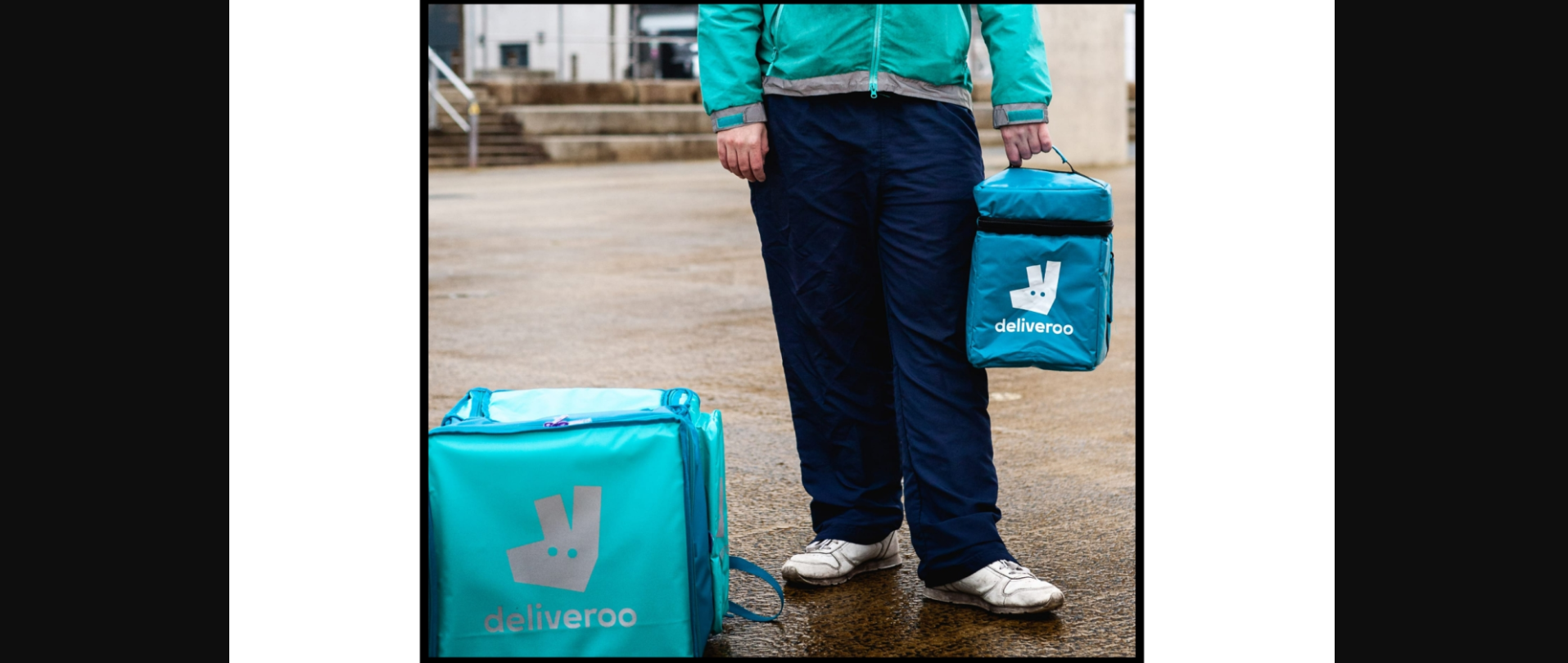
“Toothless” – How A Union’s Deal With Deliveroo Put Partnership Working In The Spotlight
In May, one of the gig economy’s most notorious firms announced a new partnership agreement with a major trade union, undermining the lengthy organising efforts of a smaller union on the ground. The deal put the model of partnership working – where unions work closely with bosses – centre stage. Union activists on the ground and those studying the gig economy spoke about the pitfalls of the deal and its wider implications.
By SC Cook. Cover image, Glyn Owen
Joe Durbidge has been working full time as a Deliveroo rider for the past three years and for a lot of that time, has been a rep for the IWGB union.
Organising on the ground amongst a mobile and precarious workforce is hard enough, but it’s made even tougher when you face an employer so hostile they’d rather spend millions on court fees than recognise your trade union.
Over that time, Joe and his union have dug in however, focussing their efforts not only on legal battles with Deliveroo, but also by building power through strikes, protests and direct action.
When we talk, it’s not surprising why Joe sounds a little deflated. The firm he and his comrades have been fighting for years have just announced a surprise partnership agreement with one of the biggest trade unions in the country, the GMB.
In some ways it’s surprising to Joe, because in the time he’s spent working and organising in the belly of the gig economy, central London, he’s never once met a Deliveroo rider who’s in the GMB union.
“The GMB don’t have any workers [in Deliveroo], not that I’m aware of,” he says in frustration. “The union has been appointed by Deliveroo to engage in this partnership agreement, which is completely contrary to workers’ right to organise.”
The agreement struck between his bosses and the third largest union in Britain was announced last month in a video released by the GMB showing smiling Deliveroo riders and describing the deal as a “new partnership between Deliveroo and GMB union.”
“Riders will continue to have the self-employed, flexible work that they value” the video said, giving four areas that the ‘partners’ would work on – safety, security, diversity and wellbeing.
For Joe and others who’ve been organising in the sector, the cosy language of partnership with a company that has fought viciously against workers’ rights for years is an anathema.
As the deal came out, without any Deliveroo riders seemingly being aware of it beforehand or consulted, the firm was in the process of fighting the IWGB union in the high court.
In fact, it has spent millions in stopping the IWGB from being able to organise among the workforce, something it now claims the GMB are free to do.
For this reason, the partnership deal was quickly labelled a form of soft union busting by the IWGB itself.
“It’s PR,” says Deliveroo rider Joe. “It’s an attempt by Deliveroo to try and pretend that they’re engaging with workers’ concerns. [But] if you actually look at the framework agreement itself, the fundamental issues around working in a platform economy aren’t addressed at all…”
“It’s legitimised the model as it currently exists.”
According to Joe, these key issues centre around pay and, “how many riders there are, which is critical to how we earn money because that sets the volume of work.”
The deal includes a commitment to a ‘pay floor’ of the minimum wage. But this only applies when workers are on an order even though in reality riders are at work for much longer than just the time they are actively completing an order.
“You have gaps between orders, you have to wait around,” Joe explains. “And because you pay for your own expenses, you’re actually needing double the minimum wage when you’re on an order to balance out. That’s essentially how it works.”
“When you look at how much you earn when you’re on an order it’s quite high because there’s all the gaps, it’s fluctuating demand.”
“What they’ve agreed to is to institute a wage floor that in reality would be not enough.”
He says what’s happened is that Deliveroo has cherry picked what areas are open for discussion and which ones are off limits, all dictated by what’s best for the company, not workers.
“If you look at things like safety, sure, maybe GMB will push them on some things,” he says. “But Deliveroo can now just make it seem like these negotiations are fruitful while preserving control over the really contentious elements of gig work.”
“Right now, it’s legitimised the model as it currently exists – that people are completely self employed.”
Self-employed status has been a central battleground between the IWGB and Deliveroo, leading to a number of high profile court cases over the years where the firm has spent millions in legal fees successfully locking its workers out of conditions such as guranteed hours, sickness and holiday pay.
Seeing this embedded in a deal signed by another union is particularly galling for IWGB members who’ve been engaged in this struggle.
“Riders are obviously not in receipt of basic employment rights, and this agreement formalises that,” says Joe.
“Why did the GMB choose to do it?”
What’s really concerning him, however, is what the other ‘partner’ in the deal gets out of it and why they signed up to it.
“Why did the GMB choose to do it, I think that’s the question.” he tells me.
“It’s quite an extraordinary thing to do. It sort of goes against all the principles of the trade union movement…what genuine force would they [GMB] have to exert in any negotiations, with no members and with an agreement that’s as threadbare as it is.”
“They must be kidding themselves if they think that that’s gonna lead to genuine and material changes.”
When the deal first emerged, it drew an instant and angry reaction from the IWGB, who have been the union most associated with Deliveroo since the company emerged as a major player in the gig economy around 8 years ago.
“Absolute state of it,” IWGB Couriers said, “Our branch, run by couriers, has no interest in cosy partnerships or deals with exploitative companies like Deliveroo.”
The union followed up with a statement which cited their numerous actions against the delivery firm, including strikes and protests, as vital in already scoring victories over sickness and parental pay, toilet access and wage boosts.
“Throughout this time Deliveroo has refused to negotiate with its workforce and has spent hundreds of thousands of pounds fighting the IWGB in court to prevent collective bargaining with its riders,” they said.
When voice.wales put IWGB’s statement to the GMB union, they replied that it was a “strong trade union recognition agreement covering pay bargaining, the right to dispute resolution, representation over health and safety, benefits and grievances.”
They said that “GMB will now negotiate pay deals on behalf of 90,000 riders” and referred to “other groups” having “less than 1 per cent membership and are totally unrepresentative.”
The union also defended self employed status, saying that “the overwhelming majority of Deliveroo riders want to remain self-employed”
“They don’t want anyone to take that away from them,” their national officer, Mick Rix, told voice.wales.
“The fundamental difference is the lack of ability to call strike action.”
But the deal and the backlash to it has brought to light a model of trade unionism which has gained traction over recent years – the idea of partnership, where unions formally work with employers to achieve shared aims.
Morgan Rhys Powell has spent the past three years studying the gig economy and has done a lot of his research with the IWGB union and Deliveroo riders.
He tells me that the deal signals a move by GMB away from organising toward partnership working.
“It’s important to say they (GMB) still do really good work in a lot of places, obviously, a lot of rank and file members of GMB are very solid trade unionists who do excellent work.”
“I think what the leadership has done here, though,” Morgan says, “is tried to sort of switch from organising to partnership with employers in the gig economy, because they’ve been left behind by the likes of the IWGB and the other smaller unions.”
Morgan says that a key difference between an organising and a partnership model, highlighted in this case, is about where union power comes from.
“What the smaller unions have been doing is starting with on the ground, grassroots organising, going out and literally speaking to delivery drivers in car parks,” he says, “figuring out who the leading drivers in the community are and then trying to build the union from there.”
“So the priority is workers power and class power.”
By contrast, partnership starts with the employer and not the workers. “Rather than trying to build a mass base of support,” Morgan continues,” you just go straight to the employer and say we’re willing to work with you if you’re willing to work with us.”
“The fundamental difference is the lack of ability to call strike action… So they’re not able to go into negotiations and say, if you don’t concede to this demand, riders will withdraw their labour. And that just really weakens them.”
This is a point backed up by IWGB member and Deliveroo rider Joe. “Aren’t they [the GMB] aware of where their power lies?” he asks rhetorically.
“How do you bring influence to bear on a company? Not just because you have a smiley agreement and walk in the room, it’s a bit messier than that.”
By contrast, he describes the IWGB’s method of organising as “worker led.”
“Look at the courier branch,” he says. “It’s filled with people that have generally done this sort of work and know what issues we face. To organise in the gig space, we’ve had to organise workers on the ground.”
He adds that the history of the IWGB is also about organising among migrant workers, and the space is “difficult to organise in, very difficult.”
“The GMB would be probably kidding themselves if they think they’re gonna recruit lots of members,” he says.
All of this was highlighted on the weekend after the deal was announced, when cops in London targeted delivery drivers over their immigration status.
The IWGB quickly mobilised against the police raids with a large demonstration which was festooned with their union flags.
Not spotted at the protest, however, were the GMB, who days earlier had declared themselves as “the union for Deliveroo Riders.”
Where were they when these same riders were under attack? “They don’t have anybody,” says Joe quickly. “It’s impossible for them to represent riders.”
“Partnership risks not being threatening enough.”
The question of membership and representation is a central factor in understanding what’s going on and why even within the same union, contrasting approaches are adopted.
At the end of May, striking GMB refuse workers in Sussex also found themselves on the end of police harassment and intimidation. Workers were dragged off a picket line and arrested by police as they questioned scab workers trying to enter the workplace.
Gary Palmer, a GMB organiser who was arrested that day, told SWP TV that because strike action against low pay was growing among refuse workers, “employers are seeking the support of the police with the backing of the government to prevent striking picketers.”
“Disgracefully employers are looking to boost anti-trade union legislation and using the growing repressive legislation by the government to call upon the police,” he said. “The power has and always will be with the workers if they unionise, organise.”
The language of militancy and class struggle was a world away from the cheery talk of partnership with a company like Deliveroo, but could also be seen clearly in the GMB’s dispute in Glasgow last year.
The union didn’t pull its punches against the employer, Cosla, or Glasgow City Council, when it led its members out on strike during the COP26 climate summit in the city in late 2021.
Morgan Rhys Powell says the key difference is about rank and file organisation on the ground.
“In places like Glasgow, in the industries where the GMB has led these kinds of very effective and powerful and militant strikes, they’ve been organising for years, they do have a membership, they are able to make that threat of strike. So that’s the key difference,” he explains.
By contrast, he says he’d be surprised if GMB had 20 members within Deliveroo before the deal was made.
“I’ve never met a Deliveroo rider who’s a GMB member. I’ve spoken to IWGB organisers who’ve never met a rider who’s a GMB member as well…And that just really weakens them.”
Part of the issue, he says, is not necessarily about individual unions, but the partnership model being advanced across the union movement more generally.
In early June, the Wales TUC welcomed a new social partnership bill from the Welsh Government, which described the model as working “on the basic principle that more can be achieved by Government, employers and workers (predominantly through their trade unions) working together in a spirit of cooperation and collaboration.”
Morgan says that whilst the agreement is still in its infancy, he worries that the shift to working with bosses could be counterproductive.
“I think the Wales TUC move towards emphasising social partnership at a time when, as they admit, employers are willing to impose really precarious and insecure conditions on workers is potentially a disastrous move. It risks not being threatening enough, not being agitational enough or not being willing to exercise our muscle enough.”
He says that in general, the partnership approach “removes the teeth of the workers movement. It undermines any sort of anger that can emerge from workers grievances, by potentially working too closely for employers.”
This is another aspect that concerns him and other critics of the model – that it tries to bring together competing class interests in a way that ultimately suits bosses.
The GMB Deliveroo deal has not come out of nowhere, and even follows similar agreements the union has made with gig economy firms such as Uber and Hermes.
But the worry is that these kinds of deals, whilst they may provide a short term boost to individual unions, ultimately serve to undermine the workers movement as a whole and strengthen the hand of employers everywhere.
“I think in hindsight we should have seen it coming,” says Joe. “I think for some time Deliveroo were looking for ways to legitimise their model.”
“They (the GMB) have been chosen by Deliveroo for a variety of reasons, but they should be a little bit more self aware of that.”



4 Comments
Comments are closed.